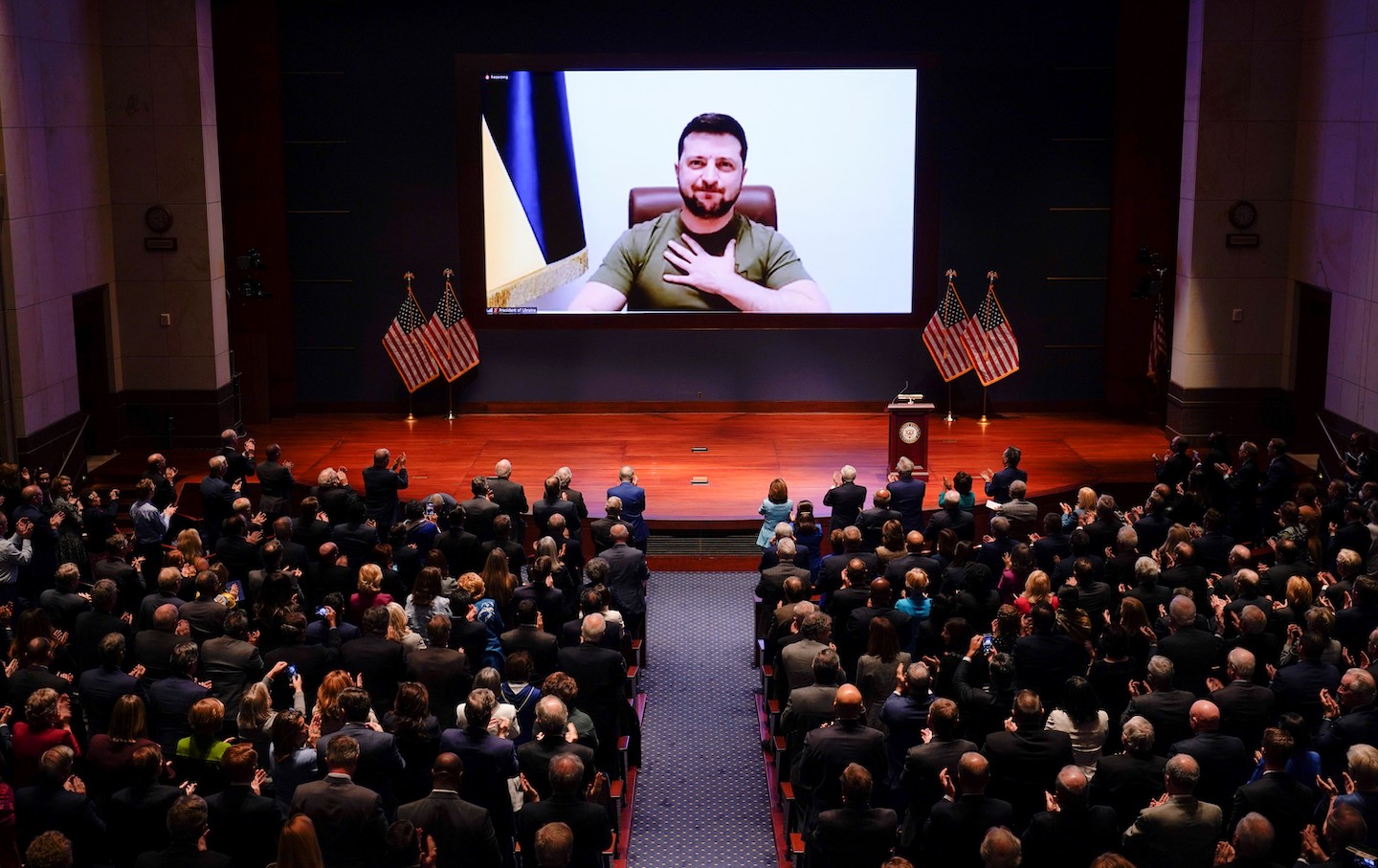
Ukrainian President Volodymyr Zelensky is seen on the screen delivering a speech via videoconference to the US Congress at the Capitol in Washington, D.C., March 16, 2022.(J. Scott Applewhite / Pool via Xinhua)
Ukrainian President Volodymyr Zelensky, speaking from his office in Kyiv, addressed both chambers of Congress on Wednesday, stressing his calls for the United States to provide more military aid and impose a no-fly zone over the country, a move that would put the world on the brink of nuclear war. As part of his plea for more weapons, Zelensky asked Congress to remember 9/11 and the Pearl Harbor attacks and presented graphic footage of the conflict and its destruction toward the end of his 18-minute video address.
Lawmakers gathered to watch the speech in the auditorium in the Capitol’s visitors’ center, and gave the Ukrainian leader a standing ovation. Zelensky invoked Dr. Martin Luther King Jr.’s famous “I have a dream” speech, Mount Rushmore, and other patriotic symbolism to appeal to the lawmakers. By the end of his remarks, some were moved to tears. But many more members of Congress were fired up, ready to push President Joe Biden to expand the US role in the conflict. “I cannot remember the last time a foreign leader united a room full of members from both sides so quickly and so intensely,” Senate majority leader Chuck Schumer said on the floor. “He spoke not just to American ears but to America’s very soul.”
Republican Senator Joni Ernst of Iowa, a veteran and member of the Senate Armed Services Committee who’s been urging the Biden administration to send fighter jets, cried after Zelensky’s address, telling reporters, “It makes me want to throw on my uniform and go help.” Another Republican lawmaker, Senator Lindsey Graham of South Carolina, doubled down on his call for the assassination of Russian President Vladimir Putin, comparing him to Hitler. “Yeah, I hope he’ll be taken out, one way or the other,” Graham said, when asked whether he stood by his previous comments. “I don’t care how they take him out.”
“If John McCain were here, he’d be saying the same thing, I think,” Graham added. “It’s time for him to go. He’s a war criminal. I wish somebody had taken Hitler out in the ’30s.”
Graham went on to say that he still wants the US to send fighter jets, despite the risks. “We’re not going to have a nuclear exchange over this,” he said. “This is a bluff by Putin. I am confident that he may be a murderer, but he’s not suicidal.”
Washington has already taken extraordinary steps in response to Russia’s invasion of Ukraine, waging financial and economic war against Russia, approving $13.6 billion for assistance to Ukraine, and flooding the country with hundreds of millions of dollars worth of weapons. Biden announced new US military aid that same day, an additional $800 million for short and longer-range anti-aircraft systems, anti-tank systems, 20 million rounds of ammunition, and drones. He promised the US would send “our most cutting-edge systems” for Ukraine to defend itself against “Putin’s depraved onslaught,” admitting that this could be “a long and difficult battle.”
Most members of Congress oppose imposing a no-fly zone over Ukraine, at least for now, and agree that doing so would escalate the conflict. The Biden administration has remained firm against these calls. Biden also recently declined a proposal from Poland to deliver MiG-29 fighter planes to Ukraine, saying “that’s called World War III.” Pundits and politicians may casually throw around the idea of a no-fly zone, but the term is a purposefully misleading euphemism for war. What it calls for is direct confrontation with the Russian military, an idea even a hawk like Senator Marco Rubio agrees with Biden on. “It means starting World War III,” Rubio said recently. “People need to understand what a no-fly zone means. It’s not some rule you pass that everybody has to oblige by. It’s the willingness to shoot down the aircraft of the Russian Federation.”
But some lawmakers are still open to the idea, especially after hearing from Zelensky this week. “I wouldn’t say [a no-fly zone] is off the table,” House Democratic Caucus Chairman Hakeem Jeffries told Axios as he left the auditorium.
Aída ChávezTwitterAída Chávez is communications director and policy adviser at Just Foreign Policy. She was previously The Nation’s D.C. correspondent and a reporter at The Intercept, More Perfect Union, and other outlets.